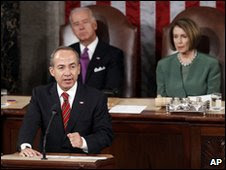This article from the Los Angeles Times is about Mexican judges coming to LA to sit in on courtroom proceedings to learn about the American Justice system. By 2016, all of the 31 mexican states are expected to have switched to an American style judicial system. In Mexico, one person is the judge and the jury. Witnesses don't take the stand, and trials aren't public. The judge just looks over reports of defense and prosecutions and makes a decision. This would make it very easy to bribe a judge. The judges from Mexico were amazed at the transparency of the trials.
This relates to the comparative government concept of institutions. Mexico is trying to change an instituition by modeling it after that of another country.







